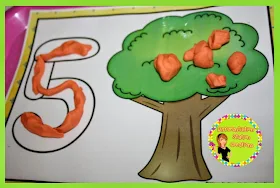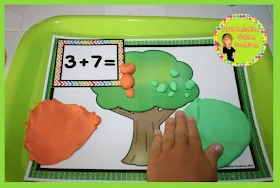I put two of my favorites together, apples and play dough, and cooked up some juicy fun!
I started out by making up a batch of play dough. We made two types of play dough. The first was a new type for me. I got the idea from Crayons and Cuties in Kindergarten. You can see her awesome post on coconut play dough and Chicka Chicka Boom Boom activities here.
The coolest part of this recipe is that it has only two ingredients: conditioner and corn starch. We used Suave Apple Conditioner, so the play dough would spell like delicious apples. You use one cup of corn starch and 5 tablespoons of conditioner. You need to make sure to stir well in between each addition of conditioner. You can see the directions in pictures on Jenn's post.
We added food coloring to the play dough to make green and red apples. Our hands did get dyed when using the food coloring, but it doesn't get on your hands once the dye is mixed in.
Notice the green hands :)
Here is our red dough.
This play dough has a very different consistency than regular play dough. My son and daughter kept asking for the apple clay. It almost feels like cloud dough. I kept the dough in the fridge and used it for several days and then tossed it. It definitely does not last like play doh!
We got our play dough recipe from Jenn, too! She got it from the Imagination Tree. This is an awesome recipe, because
#1- It lasts 6 months
#2- It's no cook
#3- It takes 4 minutes
#4- It LASTS 6 MONTHS!!
Click here to get the play dough recipe from Imagination Tree!
We added food coloring and cinnamon for an apple pie kind of smell.
We added food coloring and cinnamon for an apple pie kind of smell.
Now for the fun! We broke out the play dough mats with numbers. The kids used the dough to form the numbers. Great fine motor activity, as well as, practice with number formation. I always have them "trace" the number after they create it on the mat. It is a very tactile experience to run your finger over the bumpy play dough. It also helps them get familiar with the shapes of each numeral.
For each number, they also made the corresponding number of apples on the tree. We practiced counting with one-to-one correspondence after they created the apples.
My daughter and her friend switched mats and they "checked" the other's apples. This was a great way to have them use one-to-one correspondence and hold them accountable for their work. Plus, they loved being the teacher!
I also have apple manipulatives in the pack. We used these along with the play dough. I hot glued foam to the back of the apples. This makes them easier for kids to manipulate.
One child would make the numeral with play dough. The other would trace it and count out the same number of apples.
We talked about how many apples were in the tree and how many fell down. The kids seemed to get a kick out of this!
I also have some blank tree mats. These are so useful! We used them to tell story problems. The kids used the different colored play dough to "show" the story.
Josh saw 5 green apples in the tree. Jeremy saw 5 red, ripe apples in the same tree. How many apples were there all together?
Here is another mat. The apples aren't quite in the tree, but they are on the mat!
They wanted to make the answer in play dough after they counted the apples.
Above, you saw the basic play dough mats. Now, I want to show you the exciting part of these interactive play dough mats! I have included 3 different types of cards: numerals, ten frames, and addition sentences. It makes it very easy to differentiate for different students and ages. I am able to use the same mats and games with my four year old and a 6 year old, by simply substituting different skill cards.
Here is an example of the numeral cards. The cards are placed in a pile and the student will choose a card and represent the numeral with apples on the tree. Fun, hands-on practice for a necessary skill.
There are numeral cards to 20.
Next, are the ten frames. There are ten frames to 20. Students will choose a card and create the same number of apples on the tree. This is good for getting students comfortable with the ten frame format AND to show them that the same number can be represented in a different way.
A student created 15 apples on the tree.
There are addition cards included in the pack. There are sums to 10.
We used two different colors of play dough to represent the two numbers in the addition sentences. This can be used as a partner game. One partner can draw a card and create the number sentence with play dough.
The other partner can count up all the apples and create the number with play doh. Then, they will switch jobs.
The numeral, ten frame, and addition cards can be used for:
Memory
Go Fish
War
The numeral, ten frame, and addition cards can also be used for a memory game. Just select the specific numbers/sums that you would like your students to work on. Place the selected cards face down and have students try and match a numeral to a ten frame, numeral to addition sentence, or any combination that works for your students.
In "Go Fish", you would use two sets of cards. Either print two sets of numerals, or use a combination of numerals/ten frames/addition. Use the skills that your students need to practice. Pass out 5 cards to each student and put the remaining cards in the fish pond. Each student will ask another for the card that represents a number in their hand. If the other student doesn't have the card, they say "Go Fish"! The original student will choose a card from the fish pond. Play will continue until all the matches are found.
War is another fun game for children to play. You can call it "SMASH!". This is played just like the original "War". Choose the combination of cards that you would like to use. I often use ten frames and numerals together. Students slap down their cards and whoever has the largest amount of "apples" wins! If the students get the same number, they will put out cards for the letters in SMASH. When they flip over the last card, they will see who has the largest amount of "apples". That number SMASHES the other!! It's a fun spin on War.
I have a free "SMASH" poster that you can use with the game. This will allow students to reference the poster for the spelling of SMASH and give them a visual that the larger number wins. Click here to get your free poster.
The fun doesn't stop there! I have included extension worksheets for students to work on the specific skills. There are worksheets where students count the apples and write the matching numeral.
I was able to differentiate in a really cool way for students that need to trace the numbers. I found these cool markers at Target. They have regular markers that write in a normal color. They include markers that are white. When the students trace over the first marker, the color changes. It's so exciting and fun to kids. I have 8 year old children that ask to use these markers for different activities!
I wrote the numerals on the paper and my daughter traced them. I had her count the apples first, so she was able to demonstrate her one-to-one correspondence to me and then wrote the numerals.
Another way to really have kids focus in on one-to-one correspondence is to have them count each apple as they dot with the bingo dabber. This adds a very visual and kinesthetic component to the one-to-one correspondence.
There are ten frame extension sheets. You can have students draw the apples, but why not use a bingo dabber. It's easy to see the separate apples and so much fun!
We also used bingo dabbers to represent the matching number of apples.
There are also addition worksheets for students to complete. You can have them color or dot the apples in two different colors.
Hope you found some useful ideas to use with your kids and students! Enjoy fall :)
If you would like to purchase Apples: Interactive Play Dough Mats click here.
I've linked up with Teaching Momster for Math Madness Wednesdays!


























No comments:
Post a Comment